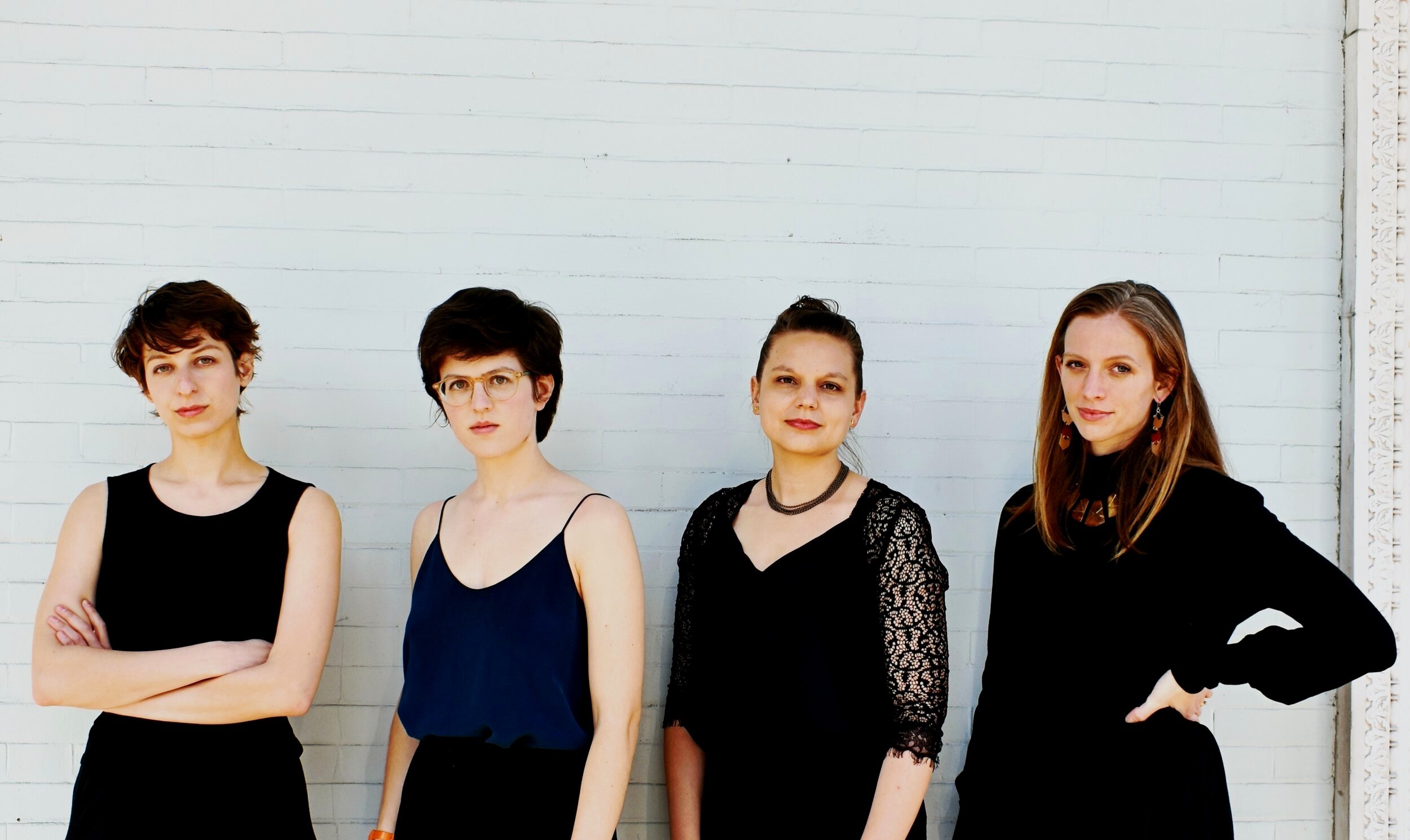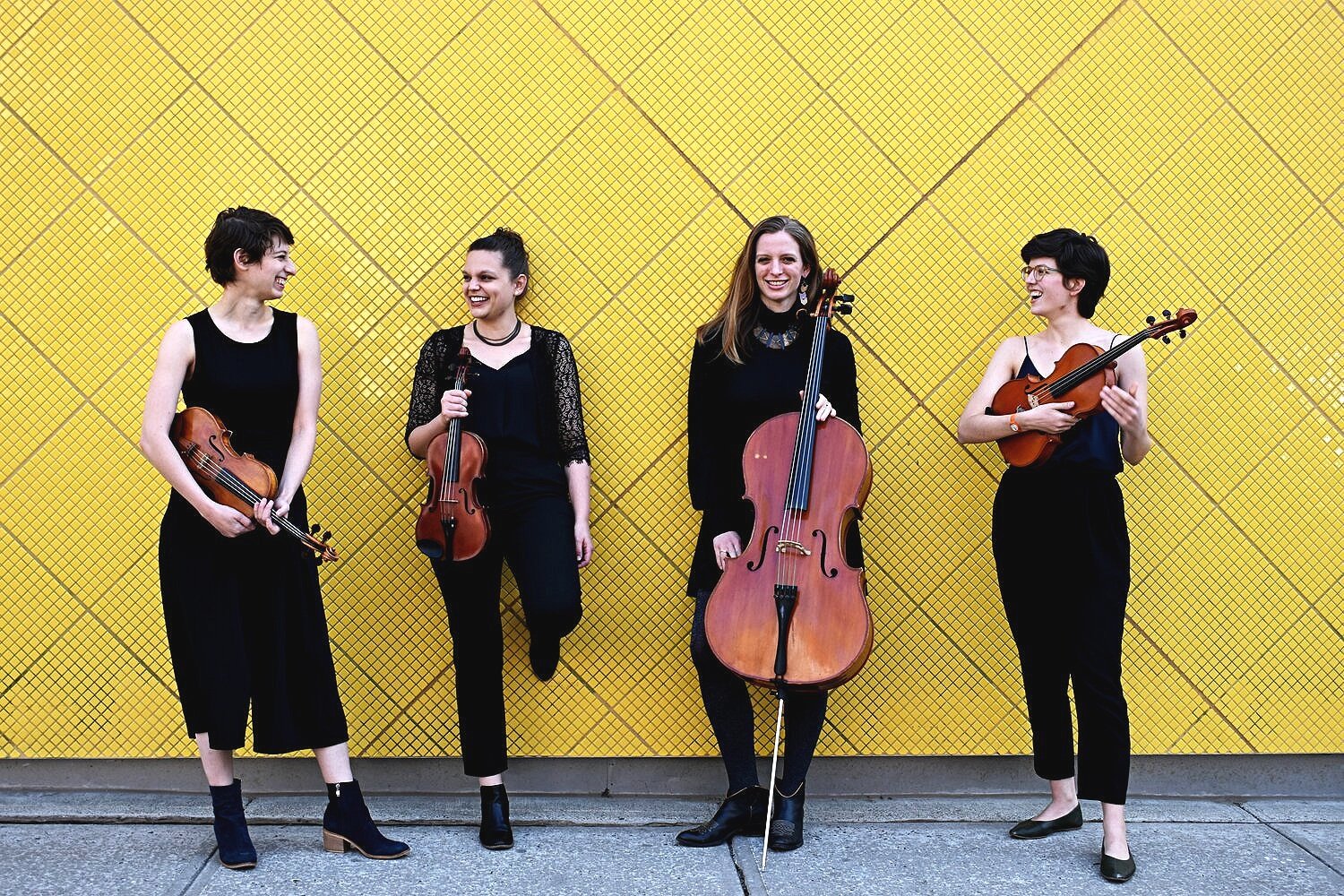B I O G R A P H Y
Praised as “fierce, fearless, and virtuosic… unapologetically stylistically omnivorous and versatile” (New Music Box) and “trailblazing...skillful composer-performers” (The New Yorker), The Rhythm Method strives to reimagine the string quartet in a contemporary, feminist context. The four performer-composers of The Rhythm Method continually expand their sonic and expressive palette through the use of improvisation, vocalization, graphic notation, songwriting, and theater.
The Rhythm Method has given performances at Roulette, Joe’s Pub, The Stone, the Met Museum, the Morris Museum, and the Noguchi Museum, and has been featured at the Lucerne Festival Forward, the American Composers Orchestra’s Sonic Festival, the String Orchestra of Brooklyn’s String Theories Festival, MATA Festival, Music Mondays, TriBeCa New Music, and the Austrian Cultural Forum’s Moving Sounds Festival. The quartet tours regularly both in the US and abroad, and has performed internationally in France, Austria, and Switzerland. The Rhythm Method seeks to nurture ongoing relationships with universities and schools, cultivating multifaceted creativity and musicianship in students of all ages. They have been in residence at Columbia University, Tulane University, Arkansas State University, Zurich University for Art and Music, Hunter College, Bowling Green State University’s College of Musical Arts, and New York University, and they serve as the quartet-in-residence for Lake George Music Festival’s Composer’s Institute.
This season’s highlights include world and U.S. premieres of new works by Cristiano Melli, Hannah Kendall, and our own quartet members; the live-album release of Anaïs Maviel’s Listen to the Rain on a solar year cycle, 2025-26; performing on the Ukrainian Contemporary Music Festival, collaborating with Columbia Composers, performing on Bang on a Can’s Long Play Festival, and returning to New York University and Lake George Music Festival's Composers Institute.
The Rhythm Method’s ongoing activities include the Hidden Mothers Project, a programming initiative that highlights works by historical women composers, and Broad Statements, an annual mini-festival celebrating creative music-making by women, non-binary, and gender-expansive people in a wide array of artistic styles.
In June 2024, the quartet released “Pastorale,” an album featuring music by Lewis Nielson, Paul Pinto, Marina Kifferstein on New Focus Recordings. Other releases include their 2022 self-titled debut album, comprised of music by all of the quartet members, “A Few Concerns” (2021), an album of cellist-singer-songwriter Meaghan Burke’s music, on Gold Bolus Recordings, and the group’s signature Wandelweiser Christmas arrangements, volumes I and II. The Rhythm Method’s recording of “Silence Seeking Solace” (with soprano Alice Teyssier) was featured on Dai Fujikura’s “Chance Monsoon” (SONY Japan).
(c) Titilayo Ayangade
G E N E R A L C O N T A C T :
therhythmmethodquartet (at) gmail.com
The Rhythm Method is:
Marina Kifferstein, Leah Asher, Carrie Frey, Meaghan Burke
“Not just virtuosic and heartfelt players, but a group of individuals with distinct compositional voices and a collective vision for the future of the string quartet.”
- Tristan McKay, I Care If You Listen
P R O G R A M S
Listen to the Rain
Approaching listening as performative and performance as meditative, listen to the rain’s instrumentation weaves Afrocentric with Eurocentric music traditions, written and oral. Grounded in the study of the Asian theories of the five elements—rather, dynamic agents—and of the bagua, the music explores their generative cycles in the body in interdependency with the earth and cosmos, as a structural base. This piece is inspired by the Taoist meditation called fusion of the 5 elements, in which the 8 forces of the bagua – and their corresponding trigrams – are called upon to spin around one’s center, where alchemical balancing and refining of the 5 dynamic agents takes place. Within the body, and in harmony with earthly and cosmic realms, the circular structure both contains and emanates these 8 forces, called by their Ancient Chinese names. This program features Anaïs Maviel on kamele n’goni and voice.
Anaïs Maviel: listen to the rain (2021) for string quartet, kamele n’goni and voices
Our live album recording will unfold over the course of a solar year, with each of its eight movements released seasonally, offering an immersive exploration of cyclical time inspired by Chinese energetics and the Taoist concept of the eight forces. Listen to Water here, and Mountain here.
Resistance Strategies
What does resistance sound like? This program gives voice to queer liberation struggles and radicalism, journeying through a whirlwind of anger, fear, unbridled joy, and resilience. Cristiano Melli’s Glitter, Shards of Rain, connects the 1969 Stonewall riots to the composer’s lived experience of growing up gay in Brazil. Hannah Kendall’s How ruin nested… responds to the tragic homophobic murders of two men in their Dallas, TX home in 2011. Works by Leah Asher and Paul Pinto stretch to emotional extremities. Finally, The Rhythm Method performs a collectively composed new work that integrates improvisation and memory, synthesizing and digesting everything that preceded it on this intense and moving program.
Cristiano Melli: Glitter, Shards of Rain (2025) *written for The Rhythm Method
Leah Asher, Upon the Wheel
Paul Pinto: Beatrice
Hannah Kendall: How ruin nested inside each thimbled throat / & made it sing (2022)
The Rhythm Method: collective improvisation
Macro and Micro
This program explores the stretch of space and time through music. Paul Pinto's I Pass'd a Church slowly unspools an original poem about the sadness and futility of rebuilding in the face of climate change, exploring the sonic possibilities of our voices and instruments. Enigma, by Anna Thorvaldsdottir and featuring immersive 360-degree video by Sigurður Guðjónsson, makes visible what is actually hidden from the human eye. Guðjónsson uses an electron microscope to scan the surface of a carbon fragment amplifying the tiniest particles to look like a nebula or a planetary landscape. Texture and melody unfold like landscapes over time, combining image and sound to form a hypnotic total work of art.
Paul Pinto: String Quartet No. 4. “I Pass’d A Church”
Anna Thorvaldsdottir: Enigma (2019)
Hidden Mothers
The Hidden Mothers Project is an initiative by The Rhythm Method to bring the music of historical women composers into the public eye through research, performance, and recording. More broadly, it is an investigation of what has gone missing in the pursuit of “Great Men” and “Great Music.” While many of the composers featured on this program achieved an impressive degree of public recognition in their lifetime, their music has often been belittled or ignored by music historians, music programmers, and musicians. This suppression of yesterday’s female voices has a direct impact on our idea of who gets to be a composer today, and contributes to the dearth of female composers, living or deceased, represented in classical and contemporary music programming. It is our hope that by giving these historical women composers their due, we can empower young female artists, as well as non-binary artists, artists of color, and artists from other marginalized groups, to continue to create and share their work with the world and to stand up to the biases which remain entrenched in so many of our cultural institutions.
Elizabeth Maconchy: String Quartet No. 3 (1938)
Florence Price: String Quartet in G (1929)
Leah Asher: Shoulder to Shoulder (2018)
Amanda Maier-Röntgen: String Quartet in A Major (1880)
(c) Titilayo Ayangade
E D U C A T I O N / W O R K S H O P S
The Rhythm Method is dedicated to working with young composers and musicians and has collaborated with a number of university composition programs, including Boston Conservatory at Berklee, New York University, Arizona State University, Tulane University, Arkansas State University, Zurich University for Art and Music, Hunter College, Youngstown State University, and Bowling Green State University’s College of Musical Arts, and they serve as the quartet-in-residence for Lake George Music Festival’s Composer’s Institute.
We offer the following educational activities as independent events or in conjunction with public performances:
Reading, Workshop, Performance and/or Recording of Student Compositions
Reading, Workshop, Performance, and/or Recording of Faculty Compositions
Extended technique workshop – with violin/viola/cello students
Performance - Rhythm Method program
Instrumental Masterclass – violin, viola, cello
Chamber Music Masterclass
Graphic Score interpretation/composition workshop
Songwriting workshop
Free Improvisation workshop
Side by side performance with a student ensemble
(c) Titilayo Ayangade
P R E S S
“No matter the project, The Rhythm Method questions the story told by our inherited history and challenges us to continuously consider the voices of who we create history with.” — Tristan McKay, I Care If You Listen
“fierce, fearless, and virtuosic… unapologetically stylistically omnivorous and versatile” — New Music Box
“The American avant garde has a long and sometimes painfully precious tradition of art strictly for art’s sake – and this quartet seems hell-bent on changing that.” — New York Music Daily
“Four skillful composer-performers...make up this trailblazing quartet.” — Steve Smith, The New Yorker
“A Few Concerns is a smart, feisty album that is both provocative and a pleasure to listen to. This is a culminating work from Meaghan Burke and The Rhythm Method that should not be missed.” — I Care If You Listen
“The Rhythm Method is one of the most forward-looking string quartets in the world.” — The Jonesboro Sun
“The Rhythm Method are, individually and collectively, fierce, fearless, and virtuosic performers. They’re also a group of players who are unapologetically stylistically omnivorous and versatile, and have a definite sense of humor – which shows in their choice to release that rare animal, a new music Christmas album. The quartet describe this album as ‘a cheeky but earnest tribute to the ethereal, soul-flossing music of the Wandelweiser composer collective’, drawing on ‘those composers’ deep engagement with silence and slowness, with gentleness and the sort of beauty you have to lean in to hear.’ If you like your holly jolly on the quieter, experimental, ASMR side, this is for you.” — New Music Box 2018 Staff Picks
“When The Rhythm Method improvise together, each of their composer minds fuse into a collective intelligence, creating a multi-layered organism with a collective intuition that I find brilliant. I resonate with this organic way of bringing music together: collaboratively with the canons of string quartet music, yet born in a patriarchal society… Although each composer’s voice is distinct, the sound of The Rhythm Method overarches any piece they perform. That ensemble creative power is a very precious ingredient for cooking this new piece together. There is a lot to experiment with in an ensemble of women composers with more than one foot stepped outside of hegemony.” — Anaïs Maviel, “5 Questions” Interview on I Care If You Listen
“This past evening’s performance by the Rhythm Method string quartet at Roulette was a stunning display of fearsome extended technique and fearless programming. The American avant garde has a long and sometimes painfully precious tradition of art strictly for art’s sake – and this all-female quartet seem hell-bent on changing that. Beyond the concert’s transgressive themes, from Margaret Atwood dystopia to the struggles of women and immigrants, the segues between the works on the bill followed as well musically as they did thematically.” — Lucid Culture
"Uncompromising and unreserved . . . intense, and sensuously gestural” . . . “impressive and gutsy programming” — Examiner.com
“...individual sounds, like nuclear fragments, gradually melded into ancient-sounding melodies and ritualistic harmonies…a hypnotic journey, which one wishes could have been repeated” — Luzerner Zeitung (in translation)
M E D I A
Paul Pinto’s String Quartet No. 4 “I Pass’d A Church”




